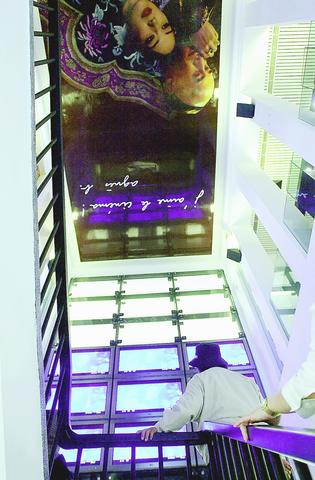It may be just another 100-year-old building, but after an extensive facelift, the former residence of US ambassador on Chungshan North Road is sporting a new look and a new purpose in life. The building, re-christened SPOT -- Taipei Film House, will officially open on Nov. 10 as an art house cinema and cultural venue.
The building, completed in 1901, when Taiwan was ruled by the Japanese, was long a focus of important diplomatic events. Between 1950 to 1979 it was home to six US ambassadors, and therefore the venue for many gatherings of Taiwan's cultural elite at a time when Taiwan was strongly influenced by the US, both politically and culturally.
"In the past, we were at a disadvantage, receiving culture and avant-garde arts from an outside culture. Now, our own artists can create avant-garde culture in this place," said Lung Ying-tai (龍應台), director of Taipei City's Bureau of Cultural Affairs, at a press conference yesterday announcing the venue's Nov. 10 opening.

PHOTO: CHEN CHEN-CHANG, TAIPEI TIMES
The renovation of the house began two years ago under the auspices of the cultural bureau and with NT$60 million in sponsorship from Taiwan Semiconductor Manufacturing Company (TSMC). Bidding for the management of the renovated building was won by acclaimed filmmaker Hou Hsiao-hsien's (侯孝賢) Association of Taiwan Film Culture (台灣電影文化協會), which planned to turn it into Taipei's first art house cinema screening non-Hollywood, independent and award winning films on a regular basis.
"In the past, as a filmmaker I used to complain to government officials about our poor cultural and film environment. Now maybe it's time to take some social responsibility and actually do something about it," Hou said.
From the outside, SPOT looks like a manor house from the American south. Inside, the building has been decorated in modern chic. The living room, where champagne parties used to be held, is now a cafe with French windows and a small terrace. And the long dining room has now become a mini branch of the Eslite Bookstore specializing in film-related books.
The master bedrooms and the guestroom on the second floor are now a bar and a VIP lounge. The ceiling of the second floor is decorated with a giant poster of Hou Hsiao-hsien's costume drama Flower of Shanghai, providing a Chinese touch.
As for the 88 seated cinema, this was originally the garage.
As Taipei's first art house cinema, SPOT will screen six films each day between 11am and 2am, selected by the Association of Taiwan Film Culture. This will be a great help to local filmmakers who always find it hard to screen their films in Taiwan, even when they have won awards in international film festivals.
Screenings were originally scheduled to begin on Nov. 10, but construction delays have put the opening of the cinema back to Nov. 15.
The opening film will be Mirror Image (命帶追逐2000), a film by Hou's pupil Hsiao Ya-chuan (蕭雅全). An urban rhapsody about destiny and coincidence, it was one of the entries at the Cannes Film Festival in 2001. Also selected as an opening feature is Fast Runner (2001) from Canada, a film about an Inuit hero leading his community in a fight against evil spirits.
A program of warmup screenings will take place between Nov. 11 to Nov. 14. (These where originally scheduled to commence last Saturday.) These films were selected by asking 10 top film professionals (writers and directors) to choose their personal favorite movies from the past five years. And, surprisingly, Hou's favorite was Hollywood sci-fi thriller, The Matrix.
SPOT -- Taipei Film House is located at 18 Chungshan N. Rd., Sec. 2, Taipei (台北市中山北路二段18號).

In the March 9 edition of the Taipei Times a piece by Ninon Godefroy ran with the headine “The quiet, gentle rhythm of Taiwan.” It started with the line “Taiwan is a small, humble place. There is no Eiffel Tower, no pyramids — no singular attraction that draws the world’s attention.” I laughed out loud at that. This was out of no disrespect for the author or the piece, which made some interesting analogies and good points about how both Din Tai Fung’s and Taiwan Semiconductor Manufacturing Co’s (TSMC, 台積電) meticulous attention to detail and quality are not quite up to

April 21 to April 27 Hsieh Er’s (謝娥) political fortunes were rising fast after she got out of jail and joined the Chinese Nationalist Party (KMT) in December 1945. Not only did she hold key positions in various committees, she was elected the only woman on the Taipei City Council and headed to Nanjing in 1946 as the sole Taiwanese female representative to the National Constituent Assembly. With the support of first lady Soong May-ling (宋美齡), she started the Taipei Women’s Association and Taiwan Provincial Women’s Association, where she

Chinese Nationalist Party (KMT) Chairman Eric Chu (朱立倫) hatched a bold plan to charge forward and seize the initiative when he held a protest in front of the Taipei City Prosecutors’ Office. Though risky, because illegal, its success would help tackle at least six problems facing both himself and the KMT. What he did not see coming was Taipei Mayor Chiang Wan-an (將萬安) tripping him up out of the gate. In spite of Chu being the most consequential and successful KMT chairman since the early 2010s — arguably saving the party from financial ruin and restoring its electoral viability —

It is one of the more remarkable facts of Taiwan history that it was never occupied or claimed by any of the numerous kingdoms of southern China — Han or otherwise — that lay just across the water from it. None of their brilliant ministers ever discovered that Taiwan was a “core interest” of the state whose annexation was “inevitable.” As Paul Kua notes in an excellent monograph laying out how the Portuguese gave Taiwan the name “Formosa,” the first Europeans to express an interest in occupying Taiwan were the Spanish. Tonio Andrade in his seminal work, How Taiwan Became Chinese,